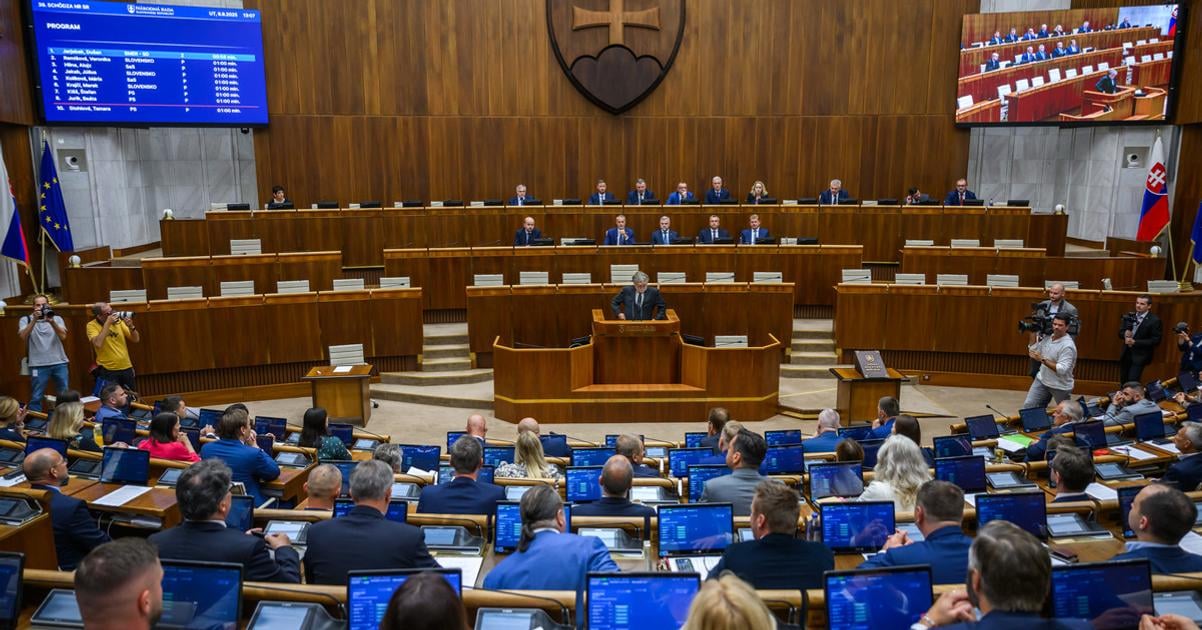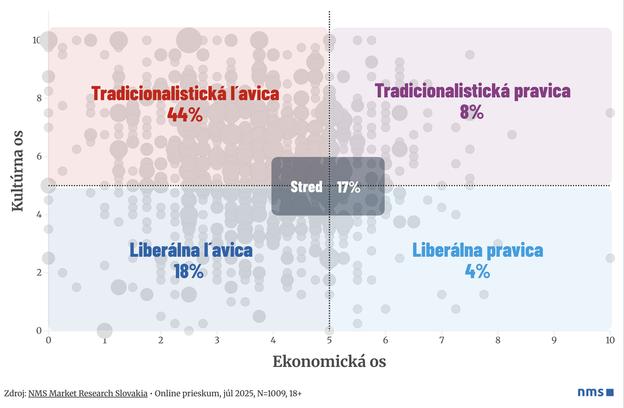Michal Mislovič is a client service manager and analyst at NMS Market Research. Denisa Lakatošová is a marketing & PR manager and analyst at NMS Market Research.
Slovakia remains a country where traditional values run deep — and where most citizens expect the state to play an active role in narrowing the gap between rich and poor. That is the central finding of an exclusive survey conducted by NMS Market Research in partnership with the daily Sme, which mapped cultural and economic attitudes across the country.
The results have been plotted into a “political compass” showing how Slovaks position themselves on two main axes: economic and cultural. Together, these reveal not just expectations of government but also the deeper value systems shaping the electorate.
For years, Slovak political debate has been framed in terms of polarisation: society split into two camps, with populist leaders eagerly exploiting the rhetoric of “us” versus “them”. Yet the NMS survey shows that the picture is far more nuanced.
While divisions are real, they do not boil down to just two opposing blocs. Instead, Slovak society falls into several distinct value-based groups, each with its own view of the state, the economy, and social issues.
More state, less migration
The survey asked respondents to place themselves along two axes.
The economic axis measures attitudes towards state intervention in the free market, redistribution, and public services. It asks, in essence, how far the state should go in reducing inequality, raising taxes, or funding welfare.
The cultural axis reflects issues shaped by globalisation, such as European integration, migration, minority rights, and climate change.
Taken together, these axes provide a map of how Slovaks see the role of the state — and how well political parties reflect the public mood.
Most Slovaks lean left in economic terms, favouring an activist state that builds a social system and reduces inequality. But views on taxation are less clear-cut: half the country remains undecided on whether higher taxes for better services or lower taxes with weaker services are preferable.
On cultural and social issues, traditional positions prevail. Many support stricter rules on immigration and oppose same-sex marriage. Views on European integration are more mixed: a quarter favour deepening it, a third think it has gone too far, and the rest sit somewhere in between. Environmental issues also divide opinion, with many reluctant to prioritise either economic growth or environmental protection.
Five political segments
Based on the survey, Slovak society can be grouped into five main segments:
Traditionalist left – 44 percent
Liberal left – 18 percent
Centre – 17 percent
Traditionalist right – 8 percent
Liberal right – 4 percent
The dominant group: traditionalist left
The largest group, at 44 percent, combines left-leaning economic views with conservative cultural positions. They want the state to do more for the poor, but also support strict immigration rules and oppose same-sex marriage. Half believe European integration has gone too far.
This group is politically active, turning out reliably at elections. Many back the current coalition or supported President Peter Pellegrini. They are more likely to be men, older (a third are Baby Boomers), and based outside the capital, particularly in the Prešov Region.
The traditionalist right: conservatives without a big state
At 8 percent, the traditionalist right shares conservative cultural views but prefers limited state involvement in the economy. They favour low taxes, even at the expense of weaker public services such as healthcare or education.
Their political engagement is weaker, with many skipping elections. When they do vote, Pellegrini is a popular choice, though some are drawn to extra-parliamentary parties such as Republika, a far-right party. They are more common in eastern Slovakia, particularly in the Košice Region.
The liberal left: equality and openness
Nearly a fifth of Slovaks fall into the liberal left. They call for reducing social inequality, protecting minorities, strengthening European integration, and prioritising environmental protection over economic growth. They strongly support same-sex marriage.
This segment is home to many Progressive Slovakia voters, most of whom backed Ivan Korčok in the last presidential election. They tend to be younger millennials (29–44), more affluent, university-educated, and concentrated in Bratislava.
The liberal right: freedom without redistribution
Just 4 percent belong here. They are firmly in favour of same-sex marriage and European integration and — of all segments — are the most opposed to strict immigration rules, favouring openness to foreigners. Compared with the Liberal Left, they are less emphatic about prioritising environmental protection. Economically, they reject redistribution: half prefer lower taxes even at the cost of leaner public services.
They are less engaged politically but lean towards Progressive Slovakia or Demokrati when they do vote. University graduates and residents of the Banská Bystrica Region are more common in this group.
The centre: politically uncertain
Seventeen percent of Slovaks occupy the middle ground. They lack firm positions on many issues, especially European integration. Those who lean in one direction tend to favour conservative values, environmental protection, lower taxes, and a somewhat stronger state role in the economy.
This group is politically hesitant: a fifth are undecided about whom to vote for, and another fifth say they would not vote at all. They are more often women and younger people aged 18–44.
Ignoring diversity comes at a cost
The survey highlights that Slovak society is more diverse than a simple government-versus-opposition divide suggests. By stoking divisions, politicians may overlook the expectations of citizens who do not fall neatly into either camp.
Yet on one point Slovaks are remarkably united: few expect their living standards to improve in the next three years. Across all groups — traditionalist or liberal, left or right — most believe their situation will either stagnate or worsen.
The questionnaire, created by NMS in July 2025, is based on 20 years of political science research showing that today’s political competition plays out on both economic and cultural axes. Find the questionnaire here.
The data were collected through an online questionnaire conducted between 2 and 7 July 2025, using the National Sample platform. A total of 1,009 respondents took part, forming a representative sample of the online population aged 18 and over.
NMS Market Research specialises in market analysis and also studies political and social issues. The agency is a member of the international organisation ESOMAR and the national association SAVA.

